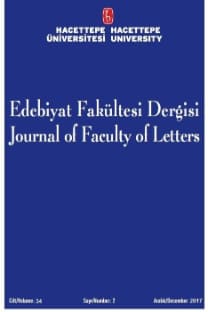Leksikografi Nedir? Terimin Uygulama ve Kuram Temelli Türkçe Karşılıkları ve Bu Karşılıkların Kapsamları
Leksikografi, metaleksikografi, leksikoloji, sözlük yazımı, sözlük
What is Lexicography? The Theory and Practice Based Turkish Equivalences of the Term and Their Scopes
Lexicography, Meta-lexicography, Lexicology, Dictionary-making, Dictionary,
___
- Akalın, Ş. H. (2010). Sözcük bilimi ve Sözlükçülük. Türk Dünyası Dil ve Edebiyat Dergisi, 162-169.
- Ayverdi, İ. (2006). Kubbealtı lugatı misalli büyük Türkçe sözlük (Cilt 3). İstanbul: Kubbealtı.
- Barnhart, C. L. (1967). Problems in editing commercial monolingual dictionaries. F. W. Householder ve S. Saporta (Ed.),
- Problems in Lexicography içinde (s.161-181). Boomington.
- Boz, E. (2011). Leksikografi teriminin tanımı ve Türkçe karşılığı üzerine. Dil ve Edebiyat Araştırmaları Dergisi (4), 9-14.
- Crystal, D. (2008). A Dictionary of linguistics and phonetics. Oxford: Blackwell Publishing.
- Filipec, J. (1982). Sprachkultur und Lexikographie. J. Scharnhorst ve E. Ising (Ed.), Grundlagen der Sprachkultur. Beitrage der
- Prager Linguistik zur Sprachtheorie und Sprachpflege Tl.2 içinde (s. 174-202). Berlin: Akademie-Verlag.
- Geeraerts, D. (1987). Types of semantic information in dictionaries. R. F. Ilson, A Spectrum of lexicography içinde (s. 1-10). John Benjamins Publishing Company.
- Hausmann, F. J. (1985). Lexikographie. C. Schwarze ve D. Wunderlich (Ed.), Handbuch der Lexikologie içinde (s. 367-411). Königstein im Taunus: Athenäum.
- Hausmann, F. J. (1989). Pour une histoire de la métalexicographie. F. J. Hausmann, O. Reichmann, H. E. Wiegand ve L. Zgusta (Ed.), Wörterbücher. Dictionaries. Dictionnaires içinde (s. 216-225). Berlin/New York: Walter de Gruyter.
- Henne, H. (1972). Semantik und Lexikographie. Berlin/ New York: Walter de Gruyter.
- Henne, H. (1973). Lexikographie. Lexikon der Germanistischen Linguistik içinde (s. 590-601). Tübingen: Niemeyer.
- Kühn, P. (1978). Deutsche Wörterbücher: Eine systematische Bibliographie. Tübingen: Niemeyer.
- Lewkowskaja, A. (1968). Lexikologie der deutschen Gegenwartssprache. Moskau: Hochschule.
- Liebold, H. (1975). Probleme des Verhältnisses von Lexikologie und Lexikographie. Beiträge zur Romanischen Philologie 14 içinde (s. 299-304). Berlin: Rütten & Loening.
- Pfeifer, W. (1997). Etymologisches Wörterbuch des Deutschen. München: dtv.
- Quemada, B. (1972). Lexicology and lexicography. T. A. Sebeok (Ed.), Current trends in linguistics içinde (s. 395-475). Paris: Mouton.
- Schaeder, B. (1981). Lexikographie als Praxis und Theorie. Tübingen: Max Niemeyer Verlag.
- Schippan, T. (1992). Lexikologie der deutschen Gegenwartssprache. Tübingen: Niemeyer.
- Wiegand, H. E. (1983). Ansätze zu einer allgemeinen Theorie der Lexikographie. J. Schildt, & D. Viehweger (Ed.), Die
- Lexikographie von heute und das Wörterbuch von morgen içinde (s. 92-127). Berlin.
- Wiegand, H. E. (1998). Wörterbuchforschung: Untersuchungen zur Wörterbuchbenutzung, zur Theorie, Geschichte, Kritik und Automatisierung der Lexikographie (Cilt 1). Berlin: Walter de Gruyter.
- ISSN: 1301-5737
- Yayın Aralığı: 2
- Başlangıç: 1983
- Yayıncı: Emine Erdoğan Özünlü
Orphan Black’te İnsan Ötesi Dişil Kimlikler ve Sayborg Aliceler
Belgesel Tiyatroda Karşı Duruş olarak Bellek The Laramie Project ve The Exonerated
Shakespeare'in Hamlet Oyununda Çürümüşlük ve Hastalık İzlekleri ve İmgeleri
Toplumsesbilgisel Açıdan Türkçede Perde Genişliğinin Konuşma Algısı ve Belirtisellik
Bulgaristan Türkü Göçmen Kadınlarının Öz-Kimlik İnşası
Etkili Çatışma Çözüm ve Müzakere Becerileri Ölçeği
